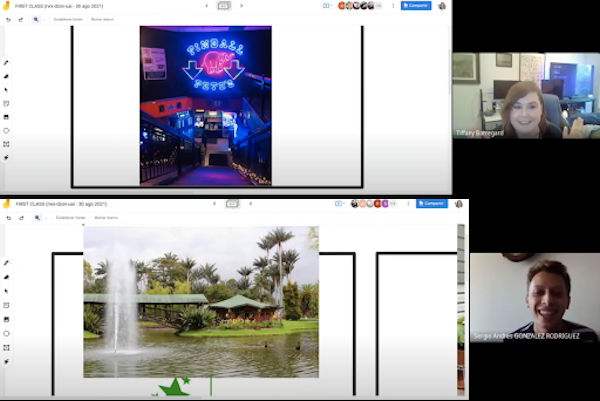SEJournal Online is the digital news magazine of the Society of Environmental Journalists. Learn more about SEJournal Online, including submission, subscription and advertising information.
 |
| University of Michigan student Tiffany Borregard (top right) and UNIMINUTO student Sergio Andrés González Rodríguez (bottom right) introduce themselves to classmates by talking about favorite places in their hometowns of Ann Arbor, Mich., and Bogotá, Colombia. Image: Courtesy Emilia Askari. |
EJ Academy: Virtual Exchange Course Fosters “Global Competency” for Student Journalists
By Emilia Askari, Philomena Meechan, Paola Ruiz-Rodríguez and Santiago Torres Sánchez
Read a Spanish-language version of this article here.
As universities around the world begin yet another semester affected by the COVID-19 pandemic, we offer a hopeful story about one way that teaching environmental journalism may change for the better — through virtual exchanges.
In academic parlance, some virtual exchanges are labeled as collaborative online international learning, or COIL. Virtual exchanges can be simply a feature of a course, which is common in international language courses. Sometimes, however, a whole course can be a virtual exchange.
In both cases, the goal is for groups of students, often in different countries, to come together virtually to achieve a common goal — whether that be mutual understanding, developing a shared knowledge in a particular discipline or collaborating on a project.
We want to share our experience creating and implementing such a virtual exchange course to teach environmental journalism. We hope that our story may inspire others to try this rewarding approach.
One-off encounter opens door to more
The professional friendships that led to our fall 2021 virtual exchange course began with a simpler exchange in fall 2020, when Santiago, Paola and three of their students participated via Zoom in a general environmental journalism course that Emilia has taught in partnership with Julie Halpert for decades at the University of Michigan.
The three students from Corporación Universitaria Minuto de Dios, or UNIMINUTO, one of the largest universities in Colombia, led an in-class discussion about news coverage of mining, which is a major environmental issue there. They also participated in a small discussion group with peers from the University of Michigan who were interested in learning about the Colombian perspective on environment news.
This lightweight collaboration built a
foundation of collegial appreciation for the
professors, enabling the larger, full-course
virtual exchange the following fall.
This lightweight collaboration built a foundation of collegial appreciation for the professors, enabling the larger, full-course virtual exchange the following fall, when all study-abroad programs on our campuses were canceled and we decided to build on our long-standing interests in global learning to connect our students for a collaborative virtual exchange course.
Emilia has taught environmental journalism at the University of Michigan for many years, while also working as an environmental journalist. Philomena co-directs the University of Michigan’s Virtual Exchange Initiative.
Paola and Santiago, meanwhile, have been professors for more than 10 years and are currently part of the faculty at the Communication Sciences School at UNIMINUTO, where they co-lead its Formative Research Group: Radio Voices in English.
The collaborative course, “Public Discourse Around Poverty & the Environment in the USA & Colombia: An International Collaboration in Learning Through Podcasting” (“Pódcasts para pensar el territorio” in Colombia), was taught in a mixture of Spanish and English, and was held entirely on Google Meet, with 10 students from the University of Michigan and 11 from UNIMINUTO.
While we attempted to recruit students with skills in the second language, we did not require students to demonstrate any particular level of proficiency. Instead, we required patience and willingness to muddle through, with occasional translation assistance during class meetings from instructors and the automated translation feature of Google Meet.
How the course worked
Based on the realization that for many, speaking in their nonnative language is generally easier than writing in that language, we designed our course to emphasize spoken communication over written. So podcasting seemed like the perfect medium to study in our course, both because the form highlights spoken communication and also because it is an increasingly popular mode for delivering journalism.
Our students would produce a series of podcast episodes on a general theme: public conversation about issues at the intersection of poverty and the environment in Colombia and the United States. The students voted on our podcast’s bilingual name: “Periodismo Across Borders” (periodismo is journalism in Spanish).
To encourage international collaborations among the students, we created teams consisting of two or three students from each university. Each team would create two versions of a single podcast episode: one in English, one in Spanish.
Teams also chose a topic related to our broad theme of environment and poverty in our two countries, including automobile pollution, urban farming, Indigenous people’s efforts to protect natural resources and governmental roadblocks to conservation efforts, using the Bogotá River and the Line 5 (may require subscription) natural gas liquids pipeline as examples.
What the student teams did
Each student recorded at least one interview related to the team’s chosen topic. UNIMINUTO students interviewed sources in Colombia, while University of Michigan students interviewed them in the United States.
We worked closely with students to help them line up interviews with those who represented a range of perspectives on each team’s topic. Instructors also created a list of common questions that we encouraged every student to ask their interviewees, starting with a description of our project and a request for recorded permission to publicly edit and post portions of the interview. Students were encouraged to add questions specific to the topic and flow of each interview.
Each team’s final podcast episodes featured soundbites from the interviews. The scripts in Spanish and English were supposed to be nearly identical. We asked students to compare and contrast how their chosen topic was discussed in the United States and Colombia, with particular attention to how people in poverty were represented in these conversations — or not.
In the English versions of these podcast episodes, the soundbites from Colombia were translated into English by student voiceovers — and vice versa in the Spanish versions of the episodes. The Spanish versions of the episodes featured a student narrator from Colombia, while the English versions featured a student narrator from the University of Michigan.
Tips for professors creating virtual exchanges
Getting started: Our collaboration would never have begun without some matchmaking by Philomena at the University of Michigan and Blanca Lucia Cely Betancourt, her counterpart at UNIMINUTO. Other universities interested in creating virtual exchanges would do well to connect with colleagues in this burgeoning corner of academic administration.
Using technology: We selected Google Meet as the platform to host our class meetings because of its amazing real-time caption-translation feature. We used Slack for asynchronous communications and Google folders for document sharing. Some resources also were shared with students from both universities via a University of Michigan course site on Canvas. (UNIMINUTO’s learning management system is Moodle.) Next time, we’ll try to use fewer different technology platforms, though we haven’t figured out exactly how.
Promoting teamwork: Also next time, we plan to create more get-to-know-you activities in small groups as early in the term as possible. Visual activities work well across language barriers. We will continue to incentivize good teamwork by telling students that they will have an opportunity to privately evaluate the contributions of each team member at the end of the project. And next time, we’ll require students to demonstrate basic proficiency in both Spanish and English.
What the students learned
While the UNIMINUTO students in our course were all majoring in journalism and communications and some had studied podcasting, this was the first college-level journalism course for the University of Michigan students, which does not have a journalism major. For decades, Emilia has taught environmental journalism through the university’s interdisciplinary undergraduate environment program.
At the University of Michigan, students submitted written reflections at the end of our course. Given the differences in the academic calendars, the UNIMINUTO students did not have time to submit similar reflections prior to the writing of this article.
One student said that the opportunity to interview Indigenous people and “hear so many new opinions and voices was irreplaceable — and will most certainly inform the way I select my news sources and my thought processes as I read, listen to or watch them.” A second student was struck by “the dangers that environmental journalists face in Colombia.”
‘I now am aware of the significance of
poverty and the environment, and am grateful
for the dramatic change of my thinking.’
— University of Michigan student
A third observed, “There are more similarities than differences for journalism in the United States and Colombia, and many of the topics that are reported on are similar. I now am aware of the significance of poverty and the environment, and am grateful for the dramatic change of my thinking.”
For a fourth student, “It was truly meaningful to learn about these issues in both the U.S. and Colombia. … [I am] realizing that the most difficult part of creating podcasts is truly gathering the full story and providing the entire truth of the situation.”
Reflecting on the challenge of working on a multilingual team, a fifth student said, “Yes, there was a language barrier, but I surprised myself with my confidence when it came to participating in the virtual exchange. … I was able to contribute my ideas and deepen my relationships with my classmates to an unexpected degree!”
You can listen to some of our students’ short audio reflections on the course. You can also find the Periodismo Across Borders podcast on Spotify. Experienced journalists and journalism educators will, of course, notice many opportunities for improvement in these student efforts. We offer these episodes not as polished works, but as raw evidence of learning in progress.
Inviting feedback, future collaborators
It would be amazing if we could extend this collaboration to other journalism courses, creating a collection of podcast episodes on similar topics. This could be an interesting, collective contribution to the historic record of how people around the world are discussing issues at the intersection of poverty and the environment in this critical decade.
We feel that promoting virtual exchanges is in the best interest of any university. Many believe that today’s students will have many occasions in their professional lives to practice the kind of intercultural, international collaboration promoted by a virtual exchange course.
Virtual exchanges teach skills that fall under the term “global competency.” These include the ability to work with people with different cultural backgrounds, across barriers of language and distance.
We welcome feedback on our project, as well as more general conversation about virtual exchanges as an approach to teaching environmental journalism. Please connect with us on our new course Twitter account, @UNIUMvirtualex.
 |
Emilia Askari teaches environmental journalism at the University of Michigan, and recently completed a Ph.D. in educational technology. She was a founding SEJ member, serving as the organization’s second president. A former reporter for the Detroit Free Press, the Miami Herald and the Los Angeles Herald Examiner, Askari has won many journalism prizes and fellowships. She co-chaired two SEJ annual conferences, including the 2018 conference in Flint, Michigan.
 |
Philomena Meechan works at the Language Resource Center of the University of Michigan, where she partners with faculty to integrate instructional technology into foreign language, literature and culture courses. She has been involved in designing and supporting virtual international exchanges since 2000 and currently co-coordinates a grant project at the University of Michigan to foster such exchanges in a variety of disciplines. She has an M.A. in romance linguistics (Spanish) from the University of Michigan.
 |
Paola Ruiz-Rodríguez is currently working toward a Ph.D. in communication studies at Universidad Nacional de La Plata (Argentina). She holds a master’s degree in Latin American philosophy and has over 15 years of experience in foreign-language teaching. Ruiz-Rodríguez has been a professor since 2008 and she’s been a faculty member at UNIMINUTO’s Communication Sciences School since 2016, where she teaches courses about communication and democracy, Latin American and gender studies.
 |
Santiago Torres Sánchez teaches communication studies and journalism at UNIMINUTO. He holds a master's degree in education. He has been a professor for more than 10 years and has expertise in intercultural communication, communication/education, communication and citizenship. Torres Sánchez has participated in radio programs for the campus radio station, Uniminuto radio 1430.
* From the weekly news magazine SEJournal Online, Vol. 7, No. 4. Content from each new issue of SEJournal Online is available to the public via the SEJournal Online main page. Subscribe to the e-newsletter here. And see past issues of the SEJournal archived here.













